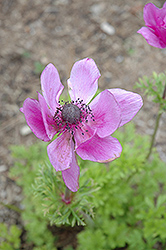It's all about ...
plants

Sylphide Grecian Windflower
Anemone coronaria 'Sylphide'
Plant Height: 6 inches
Flower Height: 12 inches
Spread: 8 inches
Sunlight:
![]()
![]()
Hardiness Zone: 6b
Other Names: Windflower, Poppy Anemone
Group/Class: Mona Lisa Series
Description:
This variety forms a dense clump of ferny foliage in spring, then produces stunning hot pink poppy-like flowers on tall stems that sway in the breeze; very pretty when massed in the garden or along borders
Ornamental Features
Sylphide Grecian Windflower is smothered in stunning hot pink buttercup flowers with black eyes at the ends of the stems from early to late spring. The flowers are excellent for cutting. Its ferny leaves remain green in colour throughout the season.
Landscape Attributes
Sylphide Grecian Windflower is a dense herbaceous perennial with an upright spreading habit of growth. Its relatively fine texture sets it apart from other garden plants with less refined foliage.
This is a relatively low maintenance plant, and is best cleaned up in early spring before it resumes active growth for the season. It is a good choice for attracting bees and butterflies to your yard. It has no significant negative characteristics.
Sylphide Grecian Windflower is recommended for the following landscape applications;
- Mass Planting
- General Garden Use
Planting & Growing
Sylphide Grecian Windflower will grow to be only 6 inches tall at maturity extending to 12 inches tall with the flowers, with a spread of 8 inches. Its foliage tends to remain low and dense right to the ground. It grows at a medium rate, and under ideal conditions can be expected to live for approximately 10 years. As an herbaceous perennial, this plant will usually die back to the crown each winter, and will regrow from the base each spring. Be careful not to disturb the crown in late winter when it may not be readily seen! As this plant tends to go dormant in summer, it is best interplanted with late-season bloomers to hide the dying foliage.
This plant does best in full sun to partial shade. It prefers to grow in average to moist conditions, and shouldn't be allowed to dry out. It is not particular as to soil type or pH. It is somewhat tolerant of urban pollution. This is a selected variety of a species not originally from North America. It can be propagated by division; however, as a cultivated variety, be aware that it may be subject to certain restrictions or prohibitions on propagation.
This plant is not reliably hardy in our region, and certain restrictions may apply; contact the store for more information.
